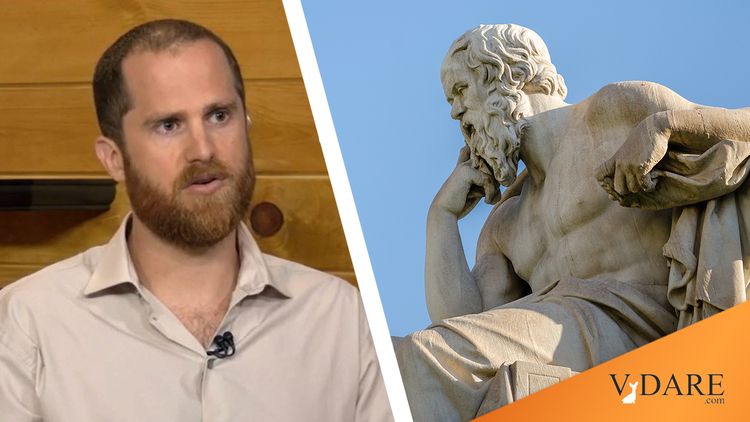


10/21/2021
From The New York Times news section:
M.I.T.’s Choice of Lecturer Ignited Criticism. So Did Its Decision to Cancel.
Dorian Abbot is a scientist who has opposed aspects of affirmative action. He is now at the center of an argument over free speech and acceptable discourse.
By Michael Powell
Michael Powell is a national reporter covering issues around free speech and expression, and stories capturing intellectual and campus debate. @powellnyt
Powell is a pretty good guy, although clearly biased with some controversial views for a reporter in 2021: I suspect that he favors free speech and expression.
Oct. 20, 2021, 1:02 p.m. ET
CHICAGO — The Massachusetts Institute of Technology invited the geophysicist Dorian Abbot to give a prestigious public lecture this autumn. He seemed a natural choice, a scientific star who studies climate change and whether planets in distant solar systems might harbor atmospheres conducive to life.
Then a swell of angry resistance arose. Some faculty members and graduate students argued that Dr. Abbot, a professor at the University of Chicago, had created harm by speaking out against aspects of affirmative action and diversity programs. In videos and opinion pieces, Dr. Abbot, who is white, has asserted that such programs treat “people as members of a group rather than as individuals, repeating the mistake that made possible the atrocities of the 20th century.” He said that he favored a diverse pool of applicants selected on merit.
He said that his planned lecture at M.I.T. would have made no mention of his views on affirmative action. But his opponents in the sciences argued he represented an “infuriating,” “inappropriate” and oppressive choice.
On Sept. 30, M.I.T. reversed course. The head of its earth, atmospheric and planetary sciences department called off Dr. Abbot’s lecture, to be delivered to professors, graduate students and the public, including some top Black and Latino high school students.
The Supreme Court has asserted since 1978’s Bakke decision that affirmative action racial goals (but not affirmative action racial quotas, those are totally different) are okay with violating the Equal Protection clause because diversity creates such a vibrantly open intellectual atmosphere on campus.
Personally, though, I was on campus in 1978, and it seemed like there was more diversity of opinion back then than in 2021. Does the Supreme Court ever admit: “Yeah, our predecessors said that, but, obviously, it has turned out they were empirically wrong.” Or would that be too subversive of the dignity of the Court?
“Besides freedom of speech, we have the freedom to pick the speaker who best fits our needs,” said Robert van der Hilst, the head of the department at M.I.T. “Words matter and have consequences.”
The majority of California voters, who voted to maintain the state constitution’s ban on affirmative action in government programs in 2020, would be banned from giving this MIT speech.
… A few fields have purged scientific terms and names seen by some as offensive, and there is a rising call for “citational justice,” arguing that professors and graduate students should seek to cite more Black, Latino, Asian and Native American scholars and in some cases refuse to acknowledge in footnotes the research of those who hold distasteful views. Still the decision by M.I.T., viewed as a high citadel of science in the United States, took aback some prominent scientists. Debate and argumentation, impassioned, even ferocious, is the mother’s milk of science, they said.
… The history of science is no less marked than other fields of learning by abhorrent chapters of suppression and prejudice. Nazi and Communist regimes twisted science to their own end, and scientists buckled, fled or suffered perilous consequences. Some professors point to aspects of that history as a cautionary tale for American science. In the United States, so-called race science — including the measurement of skulls with the intent to determine intelligence — was used to justify the subordination of Black people, Chinese, Italians, Jews and others. Experiments were carried out on people without their consent.
The worst of that history lies decades past. That said, the faculty at geoscience departments in the United States has more white faculty than some other sciences. Departments have attracted more female professors of late but struggle to recruit Black and Latino candidates. The number of Asian Americans earning geoscience degrees has decreased since the mid-1990s.
Wasn’t “race science” more related to biology and medicine, two fields not lacking in Asian-Americans these days? Or is geoscience permanently tainted by geologist Louis Agassiz’s polygenic theory?
The controversy surrounding Dr. Abbot’s canceled talk speaks as well to a tension manifest in progressive circles between social justice and free speech. Some faculty members have come to see identity and racial inequities as more urgent than questions of muzzled speech.
Phoebe A. Cohen is a geosciences professor and department chair at Williams College and one of many who expressed anger on Twitter at M.I.T.’s decision to invite Dr. Abbot to speak, given that he has spoken against affirmative action in the past.
Dr. Cohen agreed that Dr. Abbot’s views reflect a broad current in American society. Ideally, she said, a university should not invite speakers who do not share its values on diversity and affirmative action. Nor was she enamored of M.I.T.’s offer to let him speak at a later date to the M.I.T. professors. “Honestly, I don’t know that I agree with that choice,” she said. “To me, the professional consequences are extremely minimal.”
What, she was asked, of the effect on academic debate? Should the academy serve as a bastion of unfettered speech? Dr. Abbot said his speech would not include his views about diversity and affirmative action, but faculty and graduate students objected to his invitation.
“This idea of intellectual debate and rigor as the pinnacle of intellectualism comes from a world in which white men dominated,” she replied.
True.